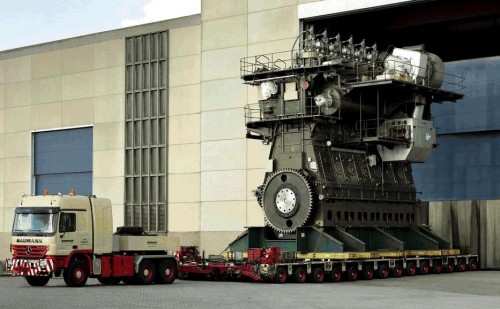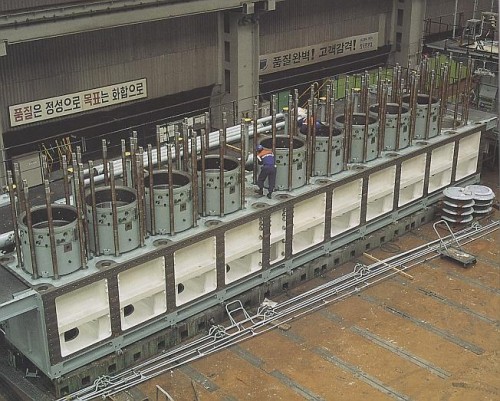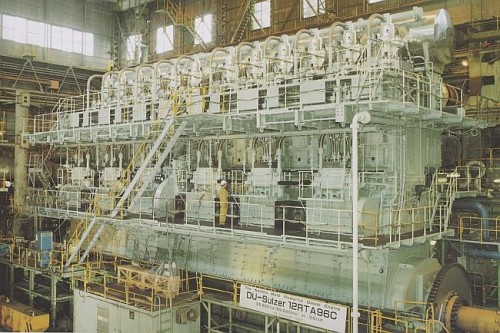The Wartsila-Sulzer RTA96-C turbocharged two-stroke diesel engine is the most powerful and most efficient prime-mover in the world today. The Aioi Works of Japan \’s Diesel United, Ltd built the first engines and is where some of these pictures were taken. It is available in 6 through 14 cylinder versions, all are inline engines. These engines were designed primarily for very large container ships. Ship owners like a single engine/single propeller design and the new generation of larger container ships needed a bigger engine to propel them. The cylinder bore is just under 38″ and the stroke is just over 98″. Each cylinder displaces 111,143 cubic inches (1820 liters) and produces 7780 horsepower. Total displacement comes out to 1,556,002 cubic inches (25,480 liters) for the fourteen cylinder version.
Some facts on the 14 cylinder version:
Total engine weight:
2300 tons (The crankshaft alone weighs 300 tons.)
Length:
89 feet
Height:
44 feet
Maximum power:
108,920 hp at 102 rpm
Maximum torque:
5,608,312 lb/ft at 102rpm
Fuel consumption at maximum power is 0.278 lbs per hp per hour (Brake Specific Fuel Consumption). Fuel consumption at maximum economy is 0.260 lbs/hp/hour. At maximum economy the engine exceeds 50% thermal efficiency. That is, more than 50% of the energy in the fuel in converted to motion.
For comparison, most automotive and small aircraft engines have BSFC figures in the 0.40-0.60 lbs/hp/hr range and 25-30% thermal efficiency range.
Even at its most efficient power setting, the big 14 consumes 1,660 gallons of heavy fuel oil per hour.



























































As if we can move away from oil……
DO WANT!!!!
I’ll take two please.
This has been nyokki’s guide to the world of facts
Next are giant cars and robots n shit.
Reading this actually depressed me. Aparently there is NO alternative to oil… @...jimmieq: Next is Oil spills, Destruction of the eco-system,..Hopefully some form of mass-genocide.
@...Moe: No, nest is Megas XLR and that robot Godzilla.
Also, how much will this set me back?
in the future it won’t matter if there are alternatives. when it runs out, our demand for oil will be irrelevant. segways and bullet trains, segways and bullet trains
Our Engine,
Which art built in Japan,
Hollowed be thy horse power…
@...Moe: Or we can transition from a drive-thru society to one that lives in Arcologies.
What happened to the “no more wall of text” thing?
Some thermodynamics geek back me up here, but isn’t >50% thermal efficiency impossible?
@...Moe:
I take it you have never heard of nuclear power at all have you ?
@... Moe: Did you miss that oil is 100% all natural and occurs in nature? Did you also miss that it leaks from the ground into the ocean all the time, regardless without the help of man?
That the eco-system is constantly changing, without regard for man? That we have hardly a basic understanding of it.
“You think man can destroy the planet? What intoxicating vanity. Let me tell you about our planet. Earth is four-and-a-half-billion-years-old. There’s been life on it for nearly that long, 3.8 billion years. Bacteria first; later the first multicellular life, then the first complex creatures in the sea, on the land. Then finally the great sweeping ages of animals, the amphibians, the dinosaurs, at last the mammals, each one enduring millions on millions of years, great dynasties of creatures rising, flourishing, dying away — all this against a background of continuous and violent upheaval. Mountain ranges thrust up, eroded away, cometary impacts, volcano eruptions, oceans rising and falling, whole continents moving, an endless, constant, violent change, colliding, buckling to make mountains over millions of years. Earth has survived everything in its time. It will certainly survive us. If all the nuclear weapons in the world went off at once and all the plants, all the animals died and the earth was sizzling hot for a hundred thousand years, life would survive, somewhere: under the soil, frozen in Arctic ice. Sooner or later, when the planet was no longer inhospitable, life would spread again. The evolutionary process would begin again. It might take a few billion years for life to regain its present variety. Of course, it would be very different from what it is now, but the earth would survive our folly, only we would not. If the ozone layer gets thinner, ultraviolet radiation sears the earth, so what? Ultraviolet radiation is good for life. It’s powerful energy. It promotes mutation, change. Many forms of life will thrive with more UV radiation. Many others will die out. Do you think this is the first time that’s happened? Think about oxygen. Necessary for life now, but oxygen is actually a metabolic poison, a corrosive glass, like fluorine. When oxygen was first produced as a waste product by certain plant cells some three billion years ago, it created a crisis for all other life on earth. Those plants were polluting the environment, exhaling a lethal gas. Earth eventually had an atmosphere incompatible with life. Nevertheless, life on earth took care of itself. In the thinking of the human being a hundred years is a long time. A hundred years ago we didn’t have cars, airplanes, computers or vaccines. It was a whole different world, but to the earth, a hundred years is nothing. A million years is nothing. This planet lives and breathes on a much vaster scale. We can’t imagine its slow and powerful rhythms, and we haven’t got the humility to try. We’ve been residents here for the blink of an eye. If we’re gone tomorrow, the earth will not miss us.” – Michael Crichton’
@GrandAdmiralThrawn: Michael Crichton, your hero i’m assuming, is great at missing the point. W
We can pollute it to toxic death for most species on the planet, and that’s what people mean when they say “destroy” it.
@...TGGeko: I’m special. Also, it’s a really big engine, how could I not post all teh relevant info?
@...Dyna-Mole: While I agree that Chrichton and GAThrawn are smoking delusion, the free market system will work this out on its’ own. Eventually extracting oil will become so expensive (because the oil will get harder and harder to get), that alternatives will become economically preferable. Solar powered hydrogen production, etc. is a pipe-dream now, only because oil is still artificially cheap.
Fuel consumption at maximum power is 0.278 lbs per hp per hour (Brake Specific Fuel Consumption). Fuel consumption at maximum economy is 0.260 lbs/hp/hour. At maximum economy the engine exceeds 50% thermal efficiency. That is, more than 50% of the energy in the fuel in converted to motion.
For comparison, most automotive and small aircraft engines have BSFC figures in the 0.40-0.60 lbs/hp/hr range and 25-30% thermal efficiency range.
Even at it’s most efficient power setting, the big 14 consumes 1,660 gallons of heavy fuel oil per hour.
@WistfulD: No expert expects oil to last into the 22nd century. Eventually a switch will be made.
Korean, not Japanese, and welcome to about 6 years ago when this was first going around 😉
@...GrandAdmiralThrawn: I only read the first line or so.. Yes oil is natural, but why do we need to burn it? Technology is also so readily avalible… so how but some technology? FYI- they just came out with a HYBRID denali/yukon- it now gets %50 better gas milage!!!! OMG 24-28 MPG!!! WOW THATS AMAZING! GO HUMANS! Go fuck yourself. AND MIKEYS DEAD!